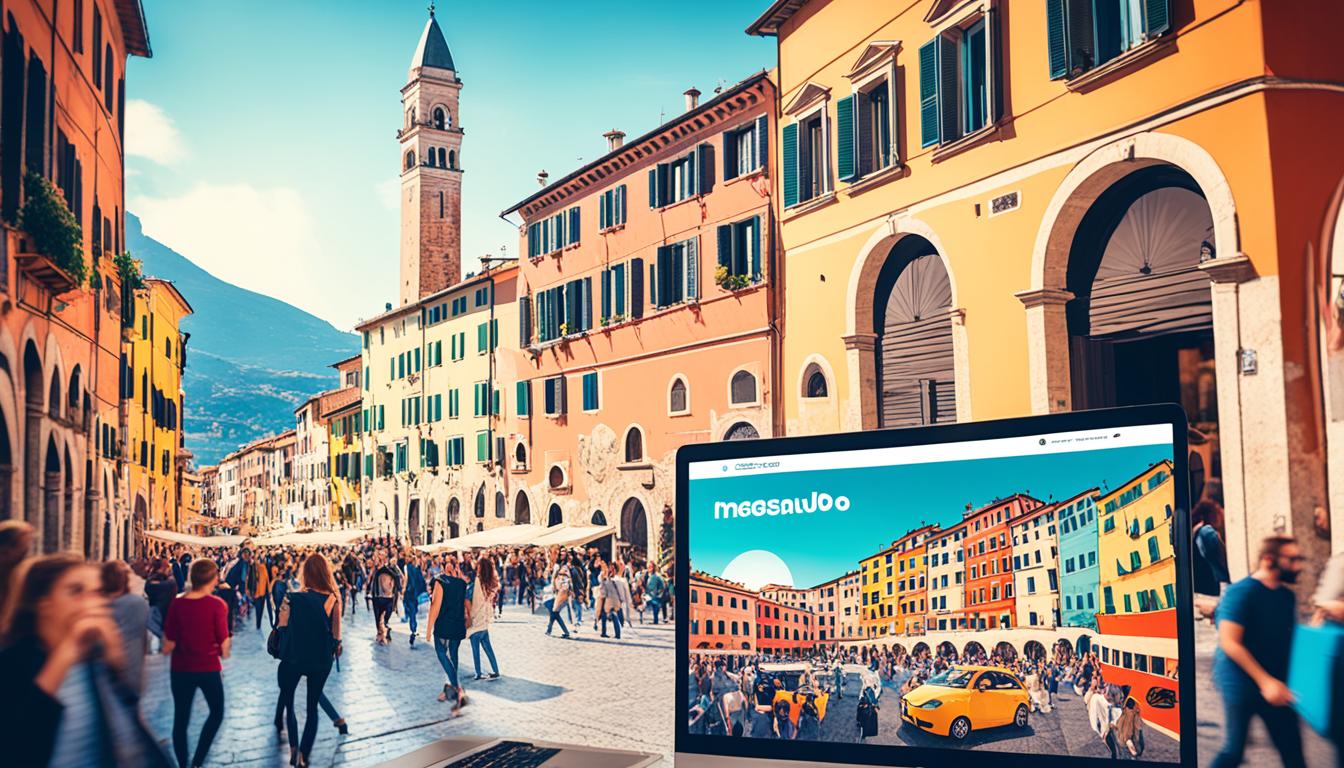“The biggest risk is not taking any risk. In a world that is changing really quickly, the only strategy that is guaranteed to fail is not taking risks.” These words by Mark Zuckerberg highlight the importance of taking risks. Starting a digital agency in Italy is a bold move. It comes with both challenges and opportunities.
This guide will help you navigate the digital world in Italy. You’ll learn about the unique challenges and chances for entrepreneurs. You’ll get key insights on setting up your agency, from understanding the local market to growing your business.
With the right knowledge and strategies, you can launch your digital agency in Italy successfully.
Key Takeaways
- Understand the distinct digital landscape in Italy.
- Identify your niche within the Italian market.
- Establish a compelling brand identity.
- Navigate the legal requirements essential for agency setup.
- Create a detailed and actionable business plan.
- Leverage digital marketing strategies to enhance visibility.
- Prepare for the common challenges faced by digital agencies.
Understanding the Digital Landscape in Italy

The digital scene in Italy has changed a lot, with more people using digital tools. This change affects many industries. Companies now use digital tools to talk to their customers, showing a big change in how people use the internet.
There’s a big push for online shopping, showing that people want things to be easy to get. This need for ease is driving the growth of online stores.
Recent figures show how key being online is for businesses. Many companies are putting a lot of effort into digital marketing to find new customers. This shows how important it is for agencies to know what Italian customers like and need.
Statistics from the Italian National Institute of Statistics show a lot of people use online services often. As more people go digital, those starting agencies need to keep up with these changes. Understanding the digital scene helps agencies make services that meet what Italian customers want.
Why Start a Digital Agency in Italy?

Starting a digital agency in Italy offers many benefits and chances in a fast-changing market. The need for digital services is growing among small and medium-sized businesses. They are moving online, creating a great chance for new agencies to help them.
The digital sector is growing fast because of a steady increase in demand for new marketing, web development, and social media management. As companies aim to improve their online presence, starting a digital agency is a good idea.
Launching a digital agency in Italy is relatively affordable compared to other businesses. This, along with Italy’s great lifestyle and culture, makes it a tempting choice for entrepreneurs. They can work and enjoy life to the fullest. This shows why it’s a great time to join this booming market.
Identifying Your Niche in the Italian Market

Finding the right niche is key to a digital agency’s success in Italy. Entrepreneurs should look into digital services that are in demand. This can give them an edge over others. By segmenting the market, they can find opportunities that might not be obvious at first.
Popular Digital Services in Italy
It’s important to offer a variety of digital services. Here are some of the most wanted services in Italy:
- Social media management
- Search engine optimisation (SEO)
- Web development
- Content creation
These areas have a lot of potential. Knowing what clients need can help find a profitable niche market.
Analyzing Competitors in Your Chosen Niche
Studying competitors is vital for new entrants in Italy’s digital scene. It helps spot strengths, weaknesses, and market gaps. By looking at others, agencies can see trends and strategies to use for themselves. Market reports offer insights on how to stand out in a crowded market.
Building Your Brand Identity

Creating a strong brand identity is key for digital agencies to stand out. It starts with making a unique brand that speaks to your audience. Important parts of visual branding include logos, colours, and messages. These elements together share what your agency stands for.
Positioning is vital in how people see your digital agency. Think about what makes you different and how customers feel about you. A clear positioning statement helps guide your branding and draws in the right clients.
- Logo Design: Your logo should capture your agency’s core. It’s the visual symbol of your brand.
- Colour Schemes: The colours you pick create feelings and links, making your brand more recognisable.
- Messaging: Your words and tone should match your brand’s values and talk to your audience.
Looking at successful Italian brands online gives us lessons on branding. These brands show how a strong brand identity boosts visibility and loyalty.
Legal Requirements for Starting a Digital Agency

Starting a digital agency in Italy means understanding the legal steps. Entrepreneurs must register their agency and pick the right business structure. Each structure has its own benefits and drawbacks, affecting how the business runs and taxes.
Choosing the Right Business Structure
In Italy, you can choose from sole proprietorships, partnerships, or limited liability companies (LLC). Picking the right structure is key for following the law and meeting legal needs.
- Sole Proprietorship: This is simple to set up and has few rules. Owners have full control but are personally responsible for all debts, which can be risky.
- Partnership: Great for sharing tasks, partnerships let you work together to run a business. Profits and losses are shared, but so are the risks, which could affect personal assets.
- Limited Liability Company (LLC): Many prefer LLCs for their protection against personal debts. They offer more security but require more paperwork and often need more money to start.
After choosing a business type, you must register your agency. This means getting the right licences, registering for taxes, and following local laws. Staying legal is crucial to avoid problems.
Creating a Comprehensive Business Plan

A well-structured business plan is key to success. It serves as a roadmap for the agency, guiding decisions. It includes important parts that make your agency’s direction clear. This ensures it matches your big goals and dreams.
Essential Components of a Business Plan
A good business plan has several key parts, like:
- Market Analysis: Knowing your market, competitors, and trends helps make smart choices.
- Organisational Structure: Defining roles makes your agency more efficient and accountable.
- Marketing Strategy: Outlining how you’ll draw in and keep clients helps meet your goals.
- Financial Projections: Including revenue forecasts and budget plans helps with financial planning.
Setting Realistic Goals and Objectives
It’s vital to set goals that are clear and achievable. They should match your agency’s vision and follow the SMART criteria. This method keeps your agency on track and motivated. It also helps in monitoring progress and making changes when needed.
Establishing Your Online Presence

In today’s digital world, having a strong online presence is key for new digital agencies. It starts with a professional website that shows who you are. A good website not only shows your services but also builds trust with potential clients.
Creating a Professional Website
A professional website should clearly show what your agency offers, your skills, and how to get in touch. It’s like your online shop and must look good, be easy to use, and work well on phones. Important things to add are:
- Clear Navigation: Make sure visitors can easily find what they need and how to contact you.
- Compelling Content: Use engaging language to show your expertise and what makes you different.
- Calls-to-Action: Place calls-to-action to encourage people to take action.
Adding a blog is also good. It lets you share news and insights often, which keeps your audience interested and brings more visitors to your site.
Importance of SEO and Content Marketing
SEO is crucial for a good online presence. Using on-page and off-page SEO makes your website more visible in search results. Make sure to optimise titles, meta descriptions, and headings with the right keywords. This should match what your target audience is looking for.
Content marketing helps your SEO by creating valuable content for your audience. This not only brings in visitors but also builds loyalty and trust. Here are some strategies to consider:
- Post high-quality blog articles regularly that offer useful information, tips, or trends.
- Use different content types like videos, infographics, and podcasts to reach more people.
- Share your content on social media and through email marketing to spread the word.
By focusing on a professional website, good SEO, and strong content marketing, your agency can improve its online presence. This will help you attract a loyal client base.
Digital Agency Marketing Strategies

For a digital agency to succeed, having strong marketing strategies is key. Using social media can greatly improve how visible and engaging a brand is. By using different platforms, agencies can make promotions that speak to their audience. This is a great way to show off what they know and connect with potential clients.
Utilising Social Media for Promotion
Social media is a vital tool for promoting a brand. Agencies can share valuable content, talk to followers, and run ads that target specific groups. Important steps include:
- Creating a content plan that fits with marketing goals.
- Talking with followers through fun posts and quick replies.
- Running ads that match the audience’s interests.
These methods draw in new clients and help build a brand community.
Networking and Building Partnerships
Networking is vital for growing in the digital world. Making partnerships can lead to working together on projects and more referrals. Good networking means:
- Going to industry events to meet new partners and clients.
- Joining online groups to share ideas and resources.
- Working with other businesses to offer more services.
Putting effort into partnerships can make a digital agency more credible and reach more people. This supports its marketing aims.
Hiring and Managing a Talented Team

Building a talented team is key for a digital agency’s success. It’s important to have good hiring strategies to draw in top talent. This ensures your agency works well.
First, identify the main roles your agency needs. These often include project managers, digital marketers, designers, and developers. Each role is crucial for delivering great services and growing the agency.
Essential Roles in a Digital Agency
- Project Managers: Responsible for overseeing projects, ensuring timelines and budgets are met.
- Digital Marketers: Focus on creating strategies to enhance online presence and drive traffic.
- Designers: Create visually appealing and functional designs for websites and digital products.
- Developers: Write code and build the technical infrastructure needed for digital solutions.
Creating a Positive Work Culture
A supportive work culture boosts collaboration, creativity, and wellbeing. Encourage open communication to build trust. A positive environment makes teams more productive and keeps them happy.
Regular feedback and team activities help too. They make the workplace a better place. Showing you care about your team’s wellbeing shows you’re serious about their success. This makes your agency look good.
Tools and Technologies for Digital Agencies

In the world of digital agencies, having the right tools and technologies is key. They make things run smoother, work better, and help manage projects well. This part will look at important software and tools for managing projects and tracking performance.
Project Management Software
Project management software is a must-have for digital agencies. It helps with assigning tasks, keeping track of progress, and working together as a team. Some top choices are:
- Asana: A simple platform for sorting out projects with boards and lists.
- Trello: Uses cards to let teams see and manage tasks visually.
- Monday.com: Offers flexible workflows that fit different project needs.
These tools make talking and working together easier. They also help meet deadlines, which boosts how well things perform.
Analytics Tools to Measure Performance
Analytics tools give deep insights into how projects are doing. They help agencies make smart choices. With these tools, tracking key performance indicators (KPIs) is easy:
- Google Analytics: Key for checking how websites do and how engaged users are.
- SEMrush: A tool that covers SEO, PPC, and checking out the competition.
- HubSpot: Combines analytics with marketing tools to boost campaign success.
Using these analytics tools leads to a data-driven approach. This is vital for ongoing improvement and success in the digital world.
Financial Management for Your Agency

Effective financial management is key to a digital agency’s success. A clear pricing structure is crucial. It helps the agency cover costs and make a profit. By looking at different pricing models, agencies can find the right fit for their services and what clients expect.
Setting Your Pricing Structure
Choosing the right pricing structure is all about balancing value and market rates. Digital agencies might look at:
- Hourly rates that charge clients based on the time spent on projects.
- Project-based fees which offer a flat rate for specified services.
- Retainer agreements that secure a continuous relationship with clients over a defined period.
Managing the budget is vital for the agency’s financial health. Keeping an eye on income and expenses helps adjust the pricing. Proper budgeting keeps cash flow steady and guides future investments. Using financial software can make managing accounts easier and more efficient.
Scaling Your Digital Agency in Italy

Scaling a digital agency in Italy means understanding the market and spotting growth chances. It’s about doing research and seeing trends that can help your business grow. This part will look at ways to scale and expand your services in the digital world.
Identifying Growth Opportunities
Looking for growth chances means doing deep market research. Here are some steps to follow:
- Analysing how consumers behave to see what they like.
- Watching competitors to find market gaps.
- Keeping up with new tech that could change how you work.
These steps help you spot where you can grow. They let you adapt and act fast.
Expanding Your Service Offerings
Adding new services is key to keeping your agency growing. Here’s how to do it:
- Looking at what your current clients need and adding more services for them.
- Checking out new markets that need special digital help.
- Training your team to learn new skills and offer more services.
Agencies that do well at this often find big growth chances. They become leaders in their field.
Common Challenges Faced by Digital Agencies
Digital agencies in Italy face many challenges that affect their work and success. One big issue is the strong competition in the market. With so many agencies competing, it’s vital to stand out by offering unique services and a strong brand identity.
Getting and keeping clients is hard for digital agencies too. It’s important to build strong client relationships. But, many agencies find it hard to meet client expectations because of operational problems. These include managing workloads, meeting deadlines, and balancing creative ideas with what clients want.
To overcome these challenges, future agency owners should look at what successful agencies do well. Using efficient project management tools and building a strong team culture can boost productivity. Also, clear communication with clients can prevent misunderstandings, leading to better client retention and growth for the agency.









